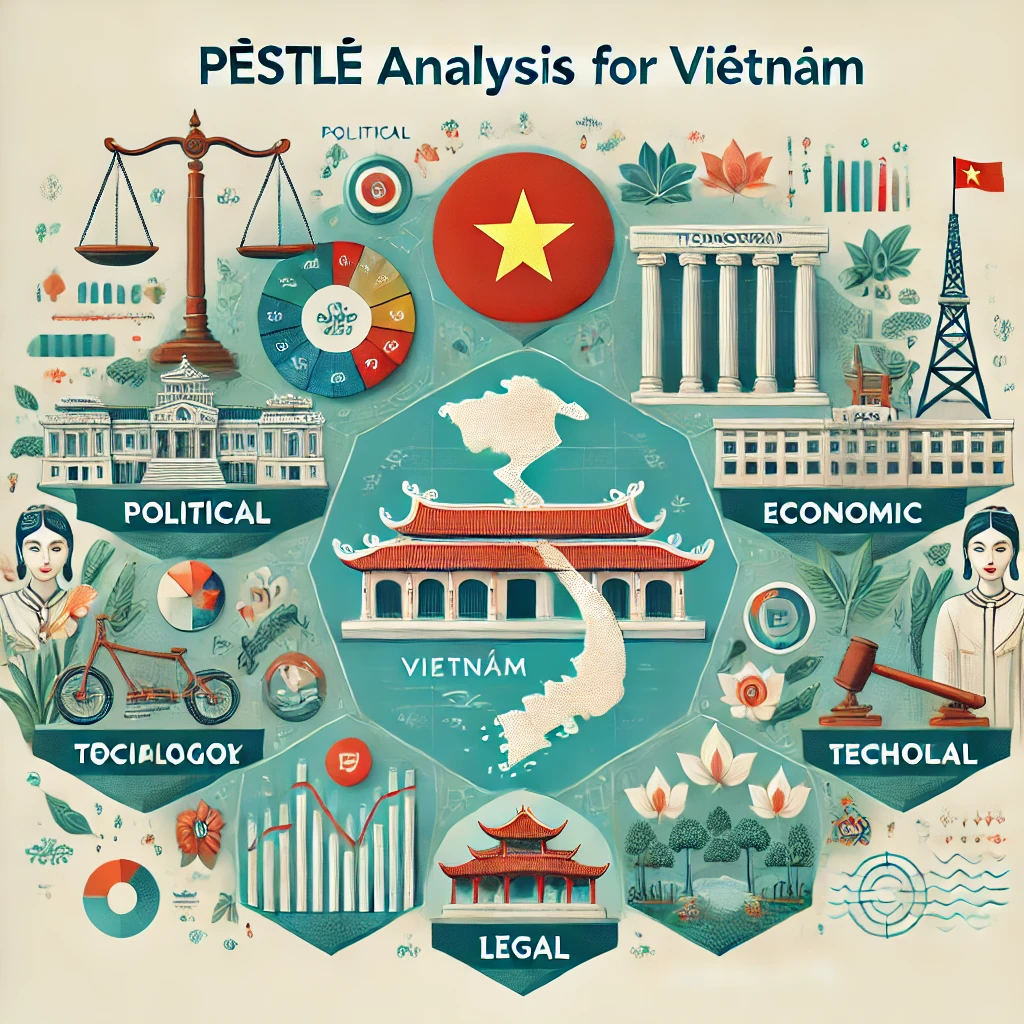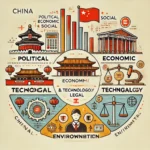A PESTLE analysis is a strategic tool used to understand the external macro-environmental factors that could impact a country or business. In the case of Vietnam, a rapidly developing Southeast Asian nation, it offers a unique combination of opportunities and challenges. With its growing economy, young workforce, and increasing foreign investment, Vietnam is becoming an attractive destination for businesses and investors. However, there are also complexities due to its political environment, social dynamics, legal framework, and environmental considerations. This PESTLE analysis will explore the political, economic, sociocultural, technological, legal, and environmental factors that shape the business landscape in Vietnam.
Table of Contents
TogglePolitical Factors:
Political factors in Vietnam play a significant role in shaping the country’s business environment. Vietnam is a socialist republic with a single-party system, where the Communist Party of Vietnam (CPV) holds significant control over government decisions. This centralized power structure provides political stability, which is appealing to investors looking for a secure environment. However, it can also lead to limitations in terms of political freedoms and regulatory transparency.
The government has implemented various pro-business reforms in recent years, encouraging foreign direct investment (FDI) and improving the overall ease of doing business. Trade agreements, such as the Comprehensive and Progressive Agreement for Trans-Pacific Partnership (CPTPP) and the EU-Vietnam Free Trade Agreement (EVFTA), have opened new markets for Vietnamese businesses and fostered closer ties with global partners.
Despite this, Vietnam faces challenges related to corruption, with the government taking steps to improve anti-corruption measures, but its effectiveness remains inconsistent. The political system’s control over media and public opinion could also affect how businesses engage with local communities and customers. Therefore, understanding Vietnam’s political landscape is essential for navigating its business environment and mitigating potential risks.
Economic Factors:
Economic factors in Vietnam are pivotal to understanding its growth potential and business environment. Vietnam has experienced rapid economic growth over the past few decades, transitioning from a primarily agrarian economy to one that is increasingly industrialized and service-oriented. The country’s GDP growth has consistently outpaced regional averages, driven by robust manufacturing, exports, and an expanding middle class.
Vietnam’s economy is highly open, with exports accounting for a significant portion of GDP. Key industries include electronics, textiles, footwear, and agricultural products, with China, the United States, and the European Union being major trade partners. Additionally, the government’s focus on infrastructure development, particularly in transport and energy, has been a catalyst for growth and foreign investment.
Inflation rates in Vietnam have been relatively stable, but the country faces challenges in addressing income inequality and poverty in certain regions. Additionally, the labor market is competitive, with a young and increasingly skilled workforce, making it attractive for businesses in sectors such as manufacturing, technology, and services. However, wage growth has been rapid, which could put pressure on businesses relying on low-cost labor.
Vietnam’s currency, the Vietnamese dong (VND), can be volatile, which presents potential risks for businesses involved in international trade. However, the government has generally maintained a stable monetary policy and is actively working to integrate the economy further into global markets.
Overall, Vietnam’s economic growth, trade openness, and favorable demographics make it an appealing destination for investment, though challenges related to inflation, income disparity, and currency fluctuations should be considered.
Social Factors:
Social factors in Vietnam are important drivers of both consumer behavior and workforce dynamics. The country has a young and growing population, with a median age of around 30 years, which provides a dynamic labor force and an expanding consumer market. This youthful population is increasingly urbanized, with more people moving to cities such as Ho Chi Minh City and Hanoi for work, education, and better living standards. This urbanization is fostering a growing middle class, with rising disposable income and changing consumption patterns, creating new opportunities for businesses in sectors like retail, technology, and services.
Vietnam’s education system has seen significant improvements in recent years, leading to a more skilled and knowledgeable workforce, particularly in fields such as engineering, technology, and business. However, there remains a gap in the availability of highly skilled professionals in certain industries, which may require businesses to invest in training and development programs.
Culturally, Vietnam has a rich heritage influenced by Confucian values, which emphasize family, hierarchy, and respect for authority. This can impact workplace dynamics, with businesses needing to understand the importance of relationships and social networks in decision-making. Additionally, while Vietnamese society is traditionally conservative, younger generations are becoming more open to global influences, especially in urban areas, driving changes in lifestyle preferences, fashion, and entertainment consumption.
Vietnam is also a predominantly Buddhist country, which affects various social and cultural norms. Religion and family play significant roles in daily life, influencing both social interactions and consumer choices. The country has made strides in improving gender equality, but traditional gender roles are still prominent, particularly in rural areas.
Overall, Vietnam’s social factors—such as its youthful and educated population, evolving cultural norms, and growing urbanization—present both challenges and opportunities for businesses looking to tap into the market. Understanding these social dynamics is essential for companies aiming to successfully integrate into the Vietnamese society and attract local consumers.
Technology Factors:
Technology factors in Vietnam are rapidly evolving, playing a crucial role in the country’s economic development and business environment. Vietnam has made significant strides in technology adoption, particularly in areas such as digital transformation, e-commerce, mobile technology, and information technology (IT) infrastructure. The government’s commitment to building a “Digital Vietnam” by 2030 has spurred the growth of the tech sector, with a focus on increasing internet penetration, improving broadband networks, and encouraging innovation.
The country has a growing startup ecosystem, especially in Ho Chi Minh City and Hanoi, where tech-driven businesses, including fintech, e-commerce platforms, and software development companies, are flourishing. This ecosystem is supported by a young and tech-savvy population, with high mobile phone penetration and increasing access to the internet. Many Vietnamese consumers are embracing digital technologies, making the market highly receptive to innovations in mobile apps, online services, and digital payments.
Vietnam is also attracting significant foreign investment in the technology sector, with companies such as Samsung, Intel, and LG establishing research and development (R&D) centers and manufacturing hubs in the country. The government’s focus on building smart cities and promoting the Internet of Things (IoT), artificial intelligence (AI), and blockchain technology further strengthens the country’s potential as a technology hub in Southeast Asia.
However, challenges remain. While urban areas have strong technological infrastructure, rural regions may still face limitations in terms of access to high-speed internet and digital literacy. Additionally, concerns about data security and privacy are emerging, as both the government and businesses work to adapt to the global standards for cybersecurity and protect consumers’ digital information.
In summary, Vietnam’s technology landscape is rapidly advancing, driven by a young and connected population, strong government support for digital initiatives, and increasing foreign investment. However, disparities between urban and rural areas and growing concerns over cybersecurity must be carefully managed to ensure continued growth and innovation in the tech sector.
Legal Factors:
Legal factors in Vietnam are essential to understanding the regulatory landscape that businesses must navigate. The legal system in Vietnam is based on civil law, with laws and regulations that cover various aspects of business operations, including labor, taxation, intellectual property, and foreign investment.
One of the key strengths of Vietnam’s legal framework is its commitment to improving the business environment through legal reforms. In recent years, the government has enacted policies to enhance transparency and simplify the legal process for foreign investors. The country has strengthened its foreign investment laws, offering more attractive incentives for foreign direct investment (FDI), such as tax exemptions and streamlined procedures for foreign-owned businesses. Moreover, Vietnam’s participation in international trade agreements like the CPTPP and the EU-Vietnam Free Trade Agreement (EVFTA) has led to the alignment of its legal frameworks with global standards, particularly in areas such as labor rights, environmental protection, and intellectual property.
However, there are challenges related to the legal system. The legal process can be slow and bureaucratic, which may lead to delays and uncertainties for businesses. There are also concerns about the consistency and transparency of enforcement, with some industries facing uneven regulation and unpredictable interpretations of laws. The level of legal protection for intellectual property rights has been improving, but counterfeiting and piracy remain issues in some sectors, particularly in consumer goods and technology.
Labor laws in Vietnam have been evolving, especially with respect to worker’s rights and protections. The government has increased efforts to improve labor conditions, but businesses should be aware of regulations on minimum wages, working hours, and employee benefits. Additionally, Vietnam’s legal system is often influenced by political considerations, and businesses should be mindful of the regulatory environment, as it can impact decision-making and compliance requirements.
In summary, while Vietnam’s legal factors are becoming more aligned with international standards, challenges related to bureaucratic inefficiencies, enforcement inconsistencies, and intellectual property protection persist. Businesses entering the Vietnamese market must stay informed about the evolving legal landscape to ensure compliance and mitigate potential risks.
Environmental Factors:
Environmental factors in Vietnam are an increasingly important consideration for businesses and policymakers, especially as the country faces challenges related to climate change, natural resource management, and sustainable development. As one of the world’s most vulnerable countries to climate change, Vietnam is experiencing rising sea levels, frequent flooding, and severe weather patterns, such as typhoons and droughts. These environmental changes have significant implications for agriculture, infrastructure, and the overall economy.
Vietnam’s government has made strides in addressing environmental issues, with policies aimed at promoting sustainable development and green growth. The country is a signatory to the Paris Agreement on climate change and has committed to reducing greenhouse gas emissions while fostering cleaner industries. The government has also introduced regulations focused on improving air quality, waste management, and energy efficiency, especially in urban centers.
The agricultural sector, a critical component of the Vietnamese economy, is particularly susceptible to environmental risks. Climate change has affected rice production and other agricultural activities, which could impact food security and export revenues. Water scarcity, soil degradation, and pesticide use are other environmental challenges that the government is working to address through better land management practices and sustainable farming techniques.
Vietnam is also focusing on renewable energy as part of its environmental strategy. The country has significant potential for solar and wind power, and the government has been encouraging investment in these sectors to reduce reliance on coal and fossil fuels. However, the shift to renewable energy is still in its early stages, and infrastructure development remains a key challenge.
Additionally, rapid urbanization and industrialization have contributed to environmental pollution, including air and water pollution, waste management issues, and deforestation. The government has been making efforts to address these concerns through stricter environmental regulations and investment in green technologies, but enforcement can be inconsistent.
In summary, environmental factors in Vietnam present both challenges and opportunities for businesses. While the country is taking steps to address environmental issues and promote sustainability, the impacts of climate change, pollution, and resource management will continue to influence business practices. Companies must be proactive in adopting sustainable practices, complying with environmental regulations, and considering long-term environmental risks when operating in the Vietnamese market.
Conclusion:
In conclusion, Vietnam presents a dynamic and rapidly evolving business environment shaped by a mix of political, economic, social, technological, legal, and environmental factors. The country’s political stability, coupled with its pro-business reforms, provides a solid foundation for growth. Economically, Vietnam’s robust growth, young workforce, and increasing foreign investment create a favorable climate for business expansion. The nation’s social dynamics, including a youthful, tech-savvy population and growing urbanization, offer both opportunities and challenges for businesses to navigate.
Technologically, Vietnam is embracing digital transformation, with significant investments in infrastructure and innovation, although there are still gaps between urban and rural areas. Legally, Vietnam is moving toward a more transparent and investor-friendly environment, though businesses must remain aware of potential bureaucratic hurdles and intellectual property concerns. Environmental challenges, particularly related to climate change, natural resource management, and pollution, will continue to shape Vietnam’s future development and business practices.
For businesses looking to enter or expand in the Vietnamese market, understanding these factors is essential. By adapting to the legal, economic, and social landscape, and taking into account environmental considerations, companies can position themselves for long-term success in one of Southeast Asia’s most promising and rapidly developing economies.


